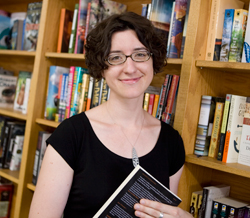Books Matter
By Sarah J. Heidt '97

My ten-month-old goddaughter Matilda* just came for a visit. Following her last afternoon nap in Gambier, her mother brought her into my bedroom, where I had been reading since morning. Because we'd been having Matilda's bedtime story in my room each night, her book was hiding in my quilts, along with the various volumes occupying me that day. I settled her into my lap for several renditions of Karma Wilson and Jane Chapman's Bear Snores On, its hard covers joining with my arms to embrace her eager, full-bodied participation in my reading aloud. She reached for her favorite animals; she mouthed along as I spoke the book's words; she turned the pages when it was time.
Her father appeared in the bedroom doorway after a few minutes. "That's why the book will survive," he said, gesturing to us. "Can you imagine doing that with a Kindle?"
My answer, of course, was no. In our intimate, lamplit tableau, the story the book told was not all-important. The material book itself—its glossy, squeaky dust jacket; its hard covers; its shiny, colorful pages—was crucial. The book itself bound us together in an intellectual, emotional, and tactile experience.
I have been a bibliophile, if not a bibliomaniac, all my life. In my earliest memory, I sit with my mother, sounding out the words in one volume of my beloved Richard Scarry Look and Learn Library boxed set; somewhere, we have a picture of me at four, sun-flushed on a hot summer afternoon, asleep beneath another of those volumes. I remember the first bookstore I frequented (a Waldenbooks in East Amherst, New York). I remember the rash pleasure I felt each time my elementary schools distributed Scholastic Books order forms or held book sales. Even school sales of used textbooks—only twenty-five cents for each battered, outdated volume—enraptured me. I could go on no family trip without an overflowing bookbag, just as now I cannot travel anywhere, for even a short time, without five or ten books—even though I know I'm entirely likely to acquire five or ten more while I'm away.
By the time I moved back to Gambier in July 2004, my bibliophilia had come to have serious material consequences. Of the three tons of possessions unloaded into a rental house I'd chosen for its built-in bookcases, my movers estimated that probably two tons had been books. Five years later, my library is scattered among my apartment, a house in England, a Gambier basement, and my Lentz House office—and I no longer have any idea how many books I own.
And yet I keep buying them, keep piling them everywhere in my life. They rest on shelves, tables, floors, washing machines; they fill the kitchen, the office, the bedroom. I cannot have enough books because I cannot know or love enough: for me books are physical embodiments of knowledge and love, tangible manifestations of curiosity and passion without end.
An electronic reader would certainly make some parts of my life easier. I would pay fewer overweight baggage fees, for one thing, and moving would get a lot cheaper. But I find myself unable to regard e-books as true, complete books. An e-book communicates a book's content without its form, and in losing the form, it loses what literally matters about books: their solid, touching, lasting presence in our world.
I don't resist new technologies for no reason. In my lifetime, I've gladly used but just as gladly abandoned a range of audio media (from vinyl to the Mini-Disc) as each has been superseded by something arguably better. When something better than my iPod comes along, I'll probably be abandoning it, too.
But for me, there simply isn't anything better, for doing what books do, than the book itself.
*Young bibliophile Matilda Grace Knauer Terrell is the daughter of Thomas Knauer '94 and Katherine Terrell '95.

 Delicious
Delicious Facebook
Facebook StumbleUpon
StumbleUpon Digg
Digg reddit
reddit